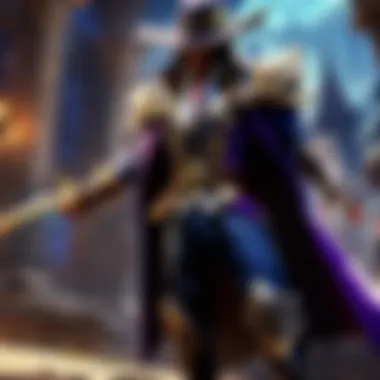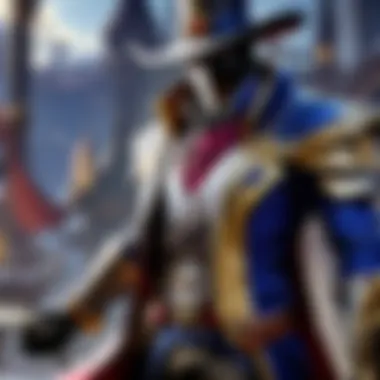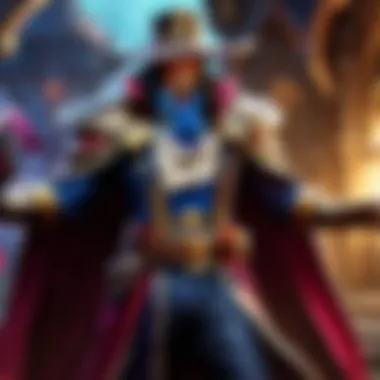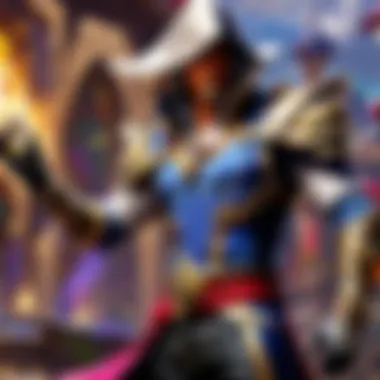Twisted Fate: Navigating Destiny in League of Legends


Intro
In the complex realm of League of Legends, the notion of twisted fate serves as a critical lens through which the interplay of chance and choice can be examined. Within this context, players navigate a constantly evolving landscape, where decisions have far-reaching consequences. This article explores how players' actions and in-game strategies shape not only their immediate outcomes but also the broader narrative of their gaming experiences.
While many might focus solely on the mechanics of the game, it is essential to delve deeper into the psychological aspects underpinning player decision-making. Every move, every ability cast, and every positioning choice carries weight. Moreover, the impact of these decisions often diverges from expectations, revealing the underlying intricacies of fate in a competitive environment.
In this exploration, we address the champion dynamics, gameplay strategies, community perspectives, and more, providing a comprehensive overview of how destiny and decision intertwine in League of Legends. Our aim is to foster a deeper understanding of tactical gameplay among enthusiasts, particularly those eager to refine their approaches and improve their skills.
Champion Spotlights
New Champion Spotlight
Understanding the nuances of newly released champions is vital for adapting to the ever-changing meta. Each champion introduces unique abilities and strategies that can significantly alter gameplay dynamics. For instance, the launch of the champion Zeri sparked discussions on her mobility and burst potential. Players quickly learned to adjust their styles, focusing on keeping distance or grouping to mitigate her impact.
Champion Builds and Strategies
Effective champion builds and strategies are crucial in maximizing potential during matches. For instance, Twisted Fate, the card magician, offers a compelling case for understanding itemization. A common build includes Luden's Tempest for burst damage, Rylai's Crystal Scepter for added crowd control, and Zhonya's Hourglass for survivability. These items enhance his ability to control fights, allowing for effective initiation and escape.
Proper rune selection also plays a vital role. The Electrocute keystone can provide a significant power spike, allowing for burst trades in lane while Manaflow Band assures sustained energy levels. Leveraging the right champion builds can often make the difference between victory and defeat.
Gameplay Tips and Strategies
Early Game Tactics
The early game often determines the trajectory of a match. Gaining an advantage in this stage can offer a crucial edge. Players should focus on objectives like securing vision and controlling jungle access. For example, placing wards near enemy jungles can provide critical information and lead to successful ambushes.
Effective laning is also pivotal. Utilizing abilities for poke and harass can secure key advantages, especially for ranged champions. Moreover, maintaining lane control and denying experience to opponents can lead to a dominant late game.
Team Fighting Strategies
Coordinating team fights is an essential aspect of League of Legends. Success hinges on effective communication, positioning, and timing. Players must focus on engaging at the right moment, often after establishing vision around key objectives. If a team can force a fight near Dragon or Baron, the stakes are considerably higher.
Each champion’s role in fights should dictate positioning; absorbing damage, dealing burst, or providing crowd control. Champions like Leona serve as natural initiators, while others like Jhin excel from the backline, inflicting damage far from danger. Understanding one's role within the team composition is key to achieving victory.
It is imperative to remember that decisions made during fights can shift the balance dramatically, often altering the course of the match.
The End
In a game defined by rapid decision-making and unpredictable outcomes, the concept of twisted fate encapsulates the core experience of League of Legends. By examining champion dynamics, gameplay strategies, and community insights, players can unlock a deeper understanding of their role in this intricate tapestry. This exploration serves as not just a guide but as an invitation to reflect on how individual choices and their consequences shape the game itself.
Preface
The complexities of decision-making in the realm of gaming are paramount to understanding the nuances of progress and outcome. In League of Legends, a popular multiplayer online battle arena game, players are often faced with choices that could significantly alter their path to victory or defeat. This article delves into how the concept of "twisted fate" plays a role in these decisions, influencing not only individual gameplay but also the broader gaming landscape.
Understanding twisted fate in gaming involves examining multiple elements, such as characters, abilities, and underlying mechanics that govern performance. What unfolds in each match is seldom a straightforward progression. Instead, it becomes an intricate dance between player choices and the inherent element of chance. The continuous interplay between decision and fate establishes a fascinating dynamic that every player grapples with, whether they are newcomers or seasoned veterans.
Exploring these themes leads to keen insights about the choices gamers face and the consequences that arise from those choices. Consequently, it allows players to sharpen their strategies, ultimately refining their skills. Moreover, as competitive esports evolve, recognizing these dynamics enhances not only personal gameplay but also community interactions and strategic discussions among players.
In this article, we will break down various aspects of twisted fate, focusing specifically on what it means in the context of League of Legends. By analyzing decision-making processes, we will reveal the core of player engagement and challenge the notion of predestined outcomes within gaming contexts.


Understanding Decision-Making
Understanding decision-making is crucial in the context of gaming. In games like League of Legends, players routinely face choices that can lead to vastly different outcomes. Each choice can affect not only the player’s performance but also that of their team and the overall match outcome. Players must weigh their options against potential risks and rewards. This process is not always straightforward. Cognitive biases and emotional responses can cloud judgment. Recognizing and addressing these factors can lead to more informed decisions.
Cognitive Dissonance in Gaming
Cognitive dissonance occurs when a player's beliefs and actions conflict, causing discomfort. For instance, when a gamer makes a poor choice and suffers losses, they might rationalize their actions despite knowing better strategies exist. This dissonance can affect subsequent decision-making. Players may stubbornly stick to their faulty strategies, reinforcing a negative cycle. Understanding cognitive dissonance can help players analyze their choices critically. By reflecting on past decisions, players can adjust their strategies and improve future outcomes.
Analyzing Risk versus Reward
In League of Legends, analyzing risk versus reward is essential for effective gameplay. Players must constantly assess situations to determine if a potential move is worth the risk. For example, considering whether to engage an enemy champion can have significant consequences. If a player feels confident in their chances and engages, they might secure a kill. However, if they underestimate the enemy’s strength, they could face defeat instead.
To excel at risk-reward analysis, players can consider several factors:
- Situation Context: Is the team ahead or behind? How many allies are nearby to support?
- Champion Abilities: What abilities are available? Do they provide a strategic advantage?
- Game State: What is the current score? Are objectives at stake?
By weighing these considerations, players can develop better judgment, leading to more favorable outcomes in matches. The skill of risk assessment becomes a critical component in the broader context of decision-making, reinforcing the need for a deep understanding of gameplay mechanics and strategies.
Game Mechanics Explored
Game mechanics play a crucial role in understanding the complexities surrounding Twisted Fate in League of Legends. This section will highlight significant elements, their benefits, and considerations that contribute to how a champion like Twisted Fate navigates the intricate dynamics of gameplay.
The mechanics dictate how players interact with the game environment, each other, and ultimately their champions. Understanding these mechanics is vital for players, especially those focusing on decision-making and strategy. Each player has unique approaches that tie back into the game’s core mechanics, making it essential to grasp the foundations for successful gameplay.
Character Abilities and Specialties
Twisted Fate is designed with abilities that emphasize his role as a spellcaster and strategist. His abilities can control the flow of battle, manipulate positioning, and create opportunities for victory. His Q ability, Pick a Card, allows him to choose a card that can stun enemies or deal damage. This gives players a tactical edge, making thoughtful decision-making a priority.
His W ability, Destiny, further enhances his specialty by enabling him to teleport to a location after revealing all enemies on the map. This information provides significant tactical advantages, as it can turn the tide during critical moments. Understanding how to leverage his abilities demands careful timing and anticipation of opponents' moves.
Some key benefits of mastering Twisted Fate's abilities include:
- Map Control: Dominating areas on the map, impacting enemy movements.
- Surprise Element: Initiating unexpected attacks on opponents.
- Skilled Playstyle: High skill ceiling for advanced strategies.
RNG: The Element of Surprise
Random Number Generation plays a pivotal role in League of Legends, influencing various gameplay aspects, including ability effectiveness and critical hits. For Twisted Fate, randomness can manifest through his unique interactions and spell choices, adding an unpredictable layer to the decision-making process.
RNG significantly impacts games by introducing an element of chance that can alter expected outcomes. For example, the card Twisted Fate draws from his Q ability is determined randomly. This randomness forces players to balance risk and adaptability in their strategies. This necessitates a mindset open to adjusting plans based on the cards available at a given moment.
"Twisted Fate exemplifies how unexpected elements can influence outcomes, requiring players to think creatively and adapt in real time."
Furthermore, players must consider the context of RNG when making decisions during gameplay. Understanding how RNG impacts Twisted Fate's interactions can lead to more informed strategic choices, ultimately enhancing gameplay experience and outcomes.
Champion Spotlight: Twisted Fate
The Champion Spotlight section on Twisted Fate is crucial in understanding his role and impact within League of Legends. As a prominent champion, his unique mechanics and lore inform both gameplay strategies and overall player interactions. This section will focus on several elements, including his background, abilities, and how strategic applications of his skills can shift the dynamics within a match.
Lore and Background
Twisted Fate, known as the Card Master, hails from the magical land of Bilgewater. His narrative is rich and filled with intrigue, making him a fascinating character. Once a part of the criminal underbelly, he leveraged his cunning and agility to navigate the treacherous waters of fate. His lore integrates themes of choice and consequence, which resonate strongly with the core ideas in gaming decision-making.


The backstory of Twisted Fate emphasizes his complex nature: a man who can manipulate chance through cards, yet often finds himself bound by the consequences of his choices. This duality elevates his character, positioning him as a figure who embodies the intricate relationship between fate and player decisions. Understanding his lore gives players insight into his motivations and the broader lore context within the League universe.
Abilities Breakdown
Twisted Fate’s abilities showcase his mastery over chance. His skills revolve around card manipulation, positioning him as a versatile champion suited for various playstyles. Key abilities include:
- Q - Wild Cards: Throws three cards in a cone, dealing damage to enemies struck. This ability offers range and area control.
- W - Pick a Card: Allows Twisted Fate to select a card, providing options for damage, stun, or utility, enhancing decision-making during gameplay.
- E - Stacked Deck: Grants bonus attack speed and ensures that his next basic attack deals additional damage. This creates bursts of damage potential.
- R - Destiny: Perhaps his most defining ability, it allows him to reveal all enemy champions and teleport at a chosen location. This skill significantly impacts map control and strategic plays.
Each ability requires a nuanced understanding of timing and positioning, making Twisted Fate a rewarding challenge to master. Players must learn to use his abilities effectively, balancing offense and utility while considering the consequences of their actions.
Strategic Applications in Gameplay
Twisted Fate's capabilities allow for various strategic applications, making him a flexible pick in League of Legends. Given his potential to influence game outcomes with his ultimate, players can employ several tactics:
- Map Pressure: By using his ultimate, players can apply pressure across lanes, forcing enemies to play defensively.
- Team Fights: Timing his abilities during skirmishes can change the tide of battle. Deploying Wild Cards correctly can inflict significant damage, while Pick a Card can secure key targets.
- Objective Control: Twisted Fate can teleport in to secure dragons or Baron Nashor, catching opponents off-guard and shifting priority.
- Split Pushing: His teleportation capability allows him to split push effectively, creating opportunities for objectives while his team distracts the enemy.
Utilizing these strategies compels players to think critically about their decisions and the overall game state. Mastering Twisted Fate involves not only skill with his abilities but also understanding when to engage, retreat, or support teammates effectively.
Ultimately, Twisted Fate serves as a prime example of how champion design influences gameplay dynamics in League of Legends. His blend of lore, abilities, and strategic applications makes him an exceptional case study in the exploration of fate and decision-making.
Competitive Scene Analysis
The competitive scene in League of Legends is a dynamic and multifaceted environment where strategic depth, skill, and quick decision-making interplay seamlessly. Understanding this scene is crucial for appreciating the nuances of gameplay, particularly for champions like Twisted Fate, whose abilities hinge upon timing and choices. The consequences of decisions made during a match can lead to swift victories or crushing defeats.
In this section, we will explore how the competitive landscape influences gameplay and how professional players utilize their expertise in navigating complex scenarios.
Professional Players’ Decisions
Professional players operate under immense pressure, where every decision can define the course of the game. Their objective is to maximize potential outcomes based on available information and possible future scenarios. This constant analysis is paramount for champions like Twisted Fate, who rely on his ultimate ability, Destiny, to turn the tide in critical situations. For instance, knowing when to engage or retreat can drastically affect not just a single match but also the overall series.
Decision-making strategies often stem from:
- Prior Experience: Veteran players draw upon past matches to inform their decisions, allowing them to anticipate opponent moves.
- Team Dynamics: Understanding each team member's playstyle and abilities facilitates more cohesive decision-making. A well-timed Gold Card can disrupt enemy plans or secure a kill when executed flawlessly.
- Meta Awareness: Staying updated on patch notes, champion balances, and the evolving nature of gameplay keeps players ahead of the competition. They adapt their strategies according to what works best in current patch cycles.
"In competitive gaming, it’s not about eliminating chance but optimizing decision-making under uncertainty."
Twisted Fate in Esports
Twisted Fate has carved a niche for himself in the esports arena through his ability to impact games with just a well-timed use of his skills. The strategic layer his character provides has been a focal point in various esports tournaments. Teams leverage his unique skill set to execute larger team strategies, such as split-pushing or ambushing the enemy.
Key highlights regarding his role in esports include:
- Global Presence: His ultimate, Destiny, provides a unique mobility advantage, allowing him to influence different lanes and support teammates across the map.
- Game Finisher: The ability to surprise opponents with teleportation plays can often lead to securing vital objectives like Dragon or Baron, which are essential for gaining a strategic edge.
- Adaptive Playstyle: His flexibility encourages diverse item builds depending on the match context, further enhancing his unpredictability as a champion.
As the game continues to evolve, the strategic use of Twisted Fate will likely adapt, demonstrating the intricate interplay between player decisions and in-game mechanics.
Community Perspectives
Community perspectives play a vital role in understanding the intricate dynamics of League of Legends, especially regarding the theme of destiny and decision. Players frequently share strategies, thoughts, and experiences, creating a vast repository of knowledge that can shape individual gameplay approaches. Such collective insights contribute not only to personal development but also to the community's growth as a whole. The exchange of ideas facilitates a deeper comprehension of character mechanics, including Twisted Fate's unique abilities and roles within various match scenarios.


Players provide context that enriches the game landscape. Discussions cover elements like team synergy, counter-play tactics, and optimal game pacing. These insights reveal how players experience moments of high-stakes decision-making and the subsequent impact on outcomes. It reveals how chance influences these decisions, particularly when players face unexpected situations. By diving into player strategies and experiences, one can derive beneficial knowledge applicable in both casual and competitive play.
Moreover, community perspectives highlight potential pitfalls or misconceptions around gameplay mechanics. Understanding these can prevent misinformation and open avenues for better decision-making among players. A deeper grasp of shared experiences can lead to more informed choices. This, in turn, influences overall performance. Collective intelligence plays a crucial part in refining systems of thought regarding agency, risk, and reward, especially in a game as complex as League of Legends.
Player Strategies and Experiences
The interplay of chance and strategy within League of Legends captures player attention profoundly. Each match presents distinct scenarios, requiring players to adapt quickly. Players often develop unique strategies that reflect their understanding of character strengths, weaknesses, and gameplay mechanics. Twisted Fate serves as an exemplar, as his abilities allow players to engage with the game in dynamic ways.
For instance, some players utilize Twisted Fate's Pick a Card ability to control the tempo of the game. By deciding when and how to use this ability, players often dictate the flow of engagement in battles. Whether to stun an opponent or draw cards for damage output illustrates the decisions players must make under pressure.
Players also share experiences regarding their successes and failures using various tactics. These narratives contribute to a nuanced understanding of risk versus reward. For instance, landing a crucial Gold Card can swing the momentum of a match, but the player must weigh the risk of overextending against the potential rewards. Communities often highlight such decisions and their impact, fostering an environment where learning becomes an ongoing process.
Discussion in Forums
Forums serve as thriving platforms for discussions surrounding player experiences with champions like Twisted Fate. Users on platforms such as Reddit and specialized League of Legends forums voice their thoughts, seeking advice or sharing insights. This discourse often revolves around both strategic applications and broader themes of fate and decision-making. Players pose questions regarding the fine points of gameplay, from optimal builds to synergy with other champions.
In these discussions, themes of chance and decision often emerge as central topics. Players consider how their choices influence game outcomes and what role luck plays. Some may emphasize moments where a well-timed ultimate substantially shifted a match's trajectory, while others may recount instances where mistakes cost them dearly.
These forum discussions cement community bonds. They also enrich individual understanding, leading to more refined approaches to gameplay. Overall, the collaborative nature of forum dialogue further elevates players' comprehension of the game's complexities. Players benefit from seeing different point of views, thus enhancing their capacity to make informed decisions during high-pressure moments.
Future Implications of Fate in Gaming
The exploration of fate in gaming, particularly within League of Legends, is becoming increasingly significant. As games evolve with technology, understanding how chance and choice influence player interactions shapes the future of gaming. Game developers are aware that the mechanics of fate, including randomness and decision-making, can enhance or hinder the gameplay experience. This understanding is vital for creating engaging environments that hold players' interest and challenge their strategic thinking.
Evolving Game Mechanics
Game mechanics are not static. The continuous evolution of these systems reflects changing player expectations and technological advancements. For instance, random number generation (RNG) is a crucial element that impacts gameplay. Players have come to accept and adapt to randomness as a core component. Future mechanics will likely incorporate dynamic elements that respond to player choices in real-time, influenced by AI and machine learning. This will not only alter how players approach each game but also deepen the narrative quality of gameplay. Game designers can create scenarios where players weigh their chances against potential outcomes, fostering engagement and strategic depth.
Key Considerations:
- Randomness and Player Retention: Integrating RNG should be done carefully to maintain fairness in competition.
- Adaptive Mechanics: Systems that learn from player behavior could offer personalized experiences, altering gameplay based on individual skill levels.
- Player Psychology: Understanding how players react to risks and rewards will shape future game designs.
The Role of AI and Algorithms
Artificial intelligence and algorithms are reshaping gaming landscapes. They play a crucial role in analyzing player choices and behaviors. As developers build more sophisticated AI, they can create environments that feel alive and responsive to player input. This leads to a more immersive experience. Moreover, AI can introduce unpredictable elements that engage players through surprising scenarios. It also allows developers to simulate complex environments where players can make impactful choices within intricate frameworks.
Implications for Gamers:
- Enhanced Strategic Depth: AI-driven opponents can offer varying levels of difficulty, encouraging players to refine their skills.
- Emergent Gameplay: Algorithms can generate unique scenarios and challenges, keeping the gaming experience fresh.
- Real-Time Adaptation: AI can utilize data to adjust difficulty and challenges based on player performance.
The End
Understanding the complexities surrounding decision-making in League of Legends, particularly in the context of Twisted Fate, is crucial for players who aspire to enhance their gameplay. The role of chance, strategy, and consequence underscores every match. With the intricate interplay of random elements and calculated choices, players face a constant barrage of decisions. This pushes them to develop their cognitive skills and adapt their strategies under pressure.
Summarizing the Complexity of Choice
Choices made in the game can lead to vastly different outcomes. Players must recognize the weight of their decisions, from on-the-spot reactions to premeditated strategies. The evolving nature of the game requires ongoing learning and adjustment. A moment’s indecision can change the tide of battle, highlighting the necessity for quick thinking and adaptability. Furthermore, understanding the mental aspect of cognitive dissonance can enhance a player's ability to cope with mistakes. This acknowledgment fosters growth, enabling gamers to refine their decision-making processes and improve their overall performance.
- Recognizing the impact of decisions is vital.
- Continuous learning is crucial for skill improvement.
- Embracing mistakes can lead to better outcomes.
Final Thoughts on Twisted Fate
The champion Twisted Fate embodies the essence of fate and decision-making. His unique abilities incorporate elements of chance and strategic depth that resonate with the broader concepts examined in this article. Players must navigate risks associated with his abilities, using them to exploit openings in enemy defenses and secure victories.
As the gaming landscape evolves, the significance of thoughtful decision-making will only increase. Acknowledging and incorporating both the chaotic nature of games and the need for planning can significantly benefit players.
In summary, delving into the various intricacies of Dragon's Twisted Fate elucidates the relationship between chance and choice, underscoring its importance in the context of League of Legends. For those seeking to master this ever-evolving game, understanding these facets can pave the way for strategic advancements and, ultimately, success.







